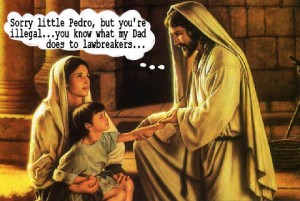Theologians are always debating the righteousness of God in justification. Is it imputed? Is it infused? Is it forensic?
I can’t tell you the torture I put myself through for decades over this kind of stuff. Like a navigator who knows if his calculation is off by the slightest degree he will miss the mark, I constantly feel like I have to get these formulations down at the outset, forgetting that all I really have to do is follow the One who not only knows but is the Way. I swear Christians make this so hard, though.
I could and perhaps will say more about that, but I have to be gone the next couple of days, so for now, just this.
From Lewis, a close paraphrase: God does not make us good [righteous] so that He can love us. Because He loves us He makes us good [righteous].
Not a righteousness [goodness] that comes through the law, be it God’s covenant law (e.g. circumcision, Sabbath keeping, dietary, etc.), like the arguments of the New Perspectives on Paul, which make a lot of sense to me, nor by the law as in moral laws, but by His grace.
Nouwen: “God’s love does not depend on our repentance or inward or outer changes.”
While I want to be one of those who repents and changes inwardly and outwardly, and believe I am, even if I’m not God loves me. This is not the message I have heard from the church, but the deficiency may be in me.
I have either heard wrongly many evangelical and/or reformed writers, teachers and preachers, or they have not said it in a way I could hear well.
God’s love precedes his imputed, infused or forensic righteousness in each of us. His love precedes creation, and creation flowed out of it. His love precedes the Fall. His love preceeds the Incarnation and is the very reason for it. God’s love precedes the cross and made the cross itself inevitable.
Intentional or not the Calvinist/Reformed tradition has taught me that unless I am among the elect I am not and never can be righteous. It has followed in my mind that if I am not among the elect, therefore righteous, God does not love me. No matter what they say, one can not know with certainty, I don’t believe, if one is elect.
I don’t care how much good fruit you produce in keeping with righteousness, you’re going to sin, and we are never going to be certain if our motivations are right, and they never will be completely pure. If our motivations are not right, our actions can’t be fully right-eous. It produces an effort to prove one’s righteousness to one’s self, so that one can be assured of God’s love and forgiveness.
So, how do I ever know I am really being Christ to other’s, really being transformed, really putting on Christ and not trying to prove to myself and others I am among the elect out of fear of damnation rather than love of God and neighbor? I don’t see how, but maybe that’s because I’m not elect.
Maybe the elect all have specific, dramatic conversion experiences and are then perpetually filled with peace, joy, gratitude and contentment, never stop growing, love selflessly and sacrificially and forgive everything all the time. Maybe the elect know they are elect and those who think they are elect and don’t know it are deceived and it’s impossible for one to be among the elect and not know it. It’s a nightmare of a labyrinth.
Yesterday I heard a radio preacher I like. I’m not going to mention names because it’s a distraction. I went to his web site and was reading the days devotion. There’s a line in it I heard countless times in the Evangelical circles in which I ran in college, and to whom I owe a great debt:
“The Holy Spirit…tells us that we are nothing, but that ‘Christ is all in all.’”
Indeed, Christ is all in all. However, the message I heard over and over is that I am nothing or I am worthless. The fact is that we elevate Christ so high that we forget what all the bother was about. Christ is exalted; He is supreme; all creation will bow before His majesty, glory and power when it is made His footstool.
No question, no doubt, but is it possible that in the way we do, we corrupt even that to the point that we claim for Christ something He never claimed for himself: that God bounded Himself in flesh, space and time, suffered and died for…nothing? That’s the word I hear all the time. Not ‘nothing’ as in for “no reason,” but ‘nothing’ as in “worthless,” the other word I hear all the time.
Like Jeremiah’s potter, God is reshaping spoiled vessels. Spoiled is not the same as nothing; it’s not the same as worthless. The misshapen vessels have such infinite value and worth that even if they are not usable in their current distorted shape, the Potter loves them so much, that rather than just discarding them and starting over, He reshapes, remolds, restores, recreates them.
God does not make us good so that He can love us. Because He loves us He is making us good.
To preach Christ and Him crucified is to preach his radical, all-encompassing, unalterable love for us.
I suppose the concern, as it has been for me often, is that if we preach this love to ourselves and others it might lead to encouraging sin to abound so grace can abound even more, or it might make us think there is to be no striving or pressing on towards the goal.
If that is what we or others hear it is not the Good News because the Good News is that because God loves us we can be recreated, not stay the same miserable, spoiled vessels and the Potter merely says “Yes, that’s exactly what I wanted to begin with. It will look lovely in this spot or I can just use it for this purpose instead. Silly me. What was I thinking?”
The full quote above from the devotion, which was adapted from Spurgeon, is “But the Holy Spirit turns our eyes entirely away from self: he tells us that we are nothing, but that ‘Christ is all in all.’”
I’m not at all certain the Holy Spirit turns our eyes entirely away from self. Away from false self, fallen self, sinful self, but not true self. Paul spends much time in 1 Corinthians 15 expounding on the resurrection of the body. We must avoid a purely spiritualized theology. Theology is incarnational and embodied. The Word made flesh and the risen Christ. We can not stop at the cross for all it’s majesty and glory.
There IS a me, a true me, a me crafted, knit together and wonderfully made. God does not want me to forget this self, but to become it. To remember it, not as though I have a memory of it, but His memory of it. His memory of ME.
We live in a self-absorbed, self-fulfillment, self-obsessed me-driven world in the grip of relativism. Be that as it may, like with everything else, it’s not purely and solely a lie. All good lies have an element of the truth, and the truth is that there is a me for God to love. Distorted, warped, and idolized though self-love may be in this world does not mean the solution is the forget self; it’s to remember our true self.
God is not running an assembly line in which we turn to Him, climb on the conveyor belt and God stamps out a Jesus such that when we stand before Him all He sees is His Son.
In The Wrinkle in Time, Meg defeats the lies of the enemy with this truth: “Like and equal are not the same thing at all!” Because I am clothed in Christ does not mean there is no me to be clothed. Because I am made like Jesus does not mean I am the same as Jesus.
I don’t know how many times I have heard “When God looks at you on Judgment Day, He will see Jesus.” When I stand before God He will see the true me I can only be IN Christ.
Heaven will not be populated with a bunch of Jesus clones. Only Jesus is Jesus, thanks be to God. Heaven will be populated with resurrected, unique, infinitely precious, incalculably valuable people of inestimable worth, spoiled vessels recreated.
God does not make us good so that He can love us. Because He loves us He is making us good.
To me, it makes all the difference in the world.


